How To Calm An Anxious Dog at Night? (7 DIY Tips)
Does your dog freak out at night and bark, howl, and whine incessantly? He or she might be suffering from night anxiety, a fairly common condition in many nervous dogs.
Anxious dogs have it rough, the poor things, and night anxiety is not a standalone problem but rather, a jigsaw puzzle piece that fits into a bigger picture.
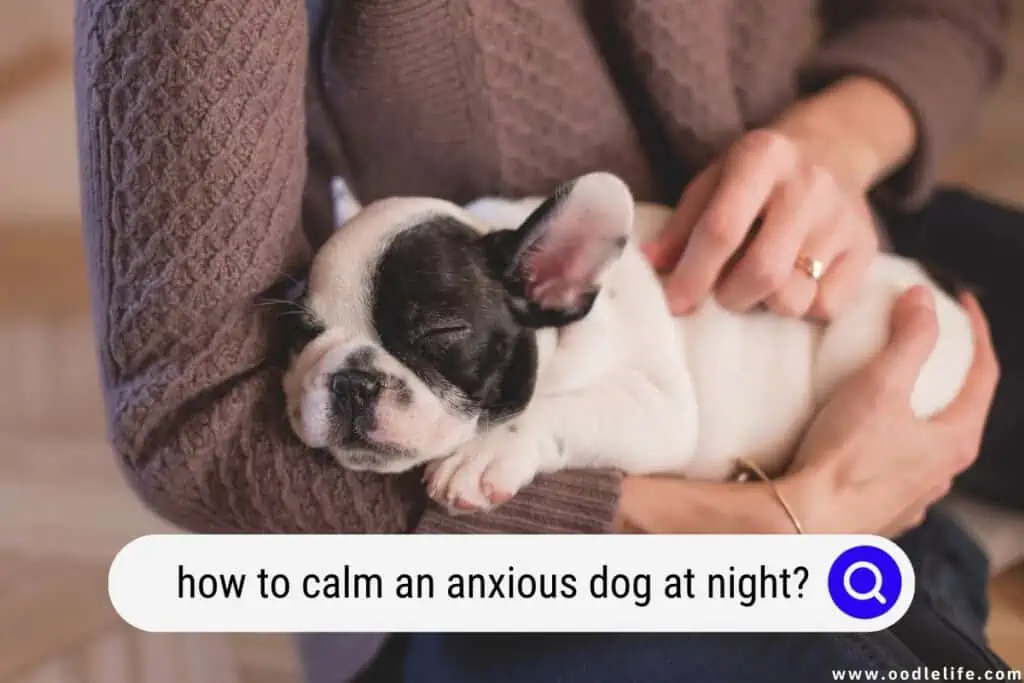
In this blog post, we’ll look more closely at the causes of anxiety in dogs and how to help.
What Is Anxiety In Dogs?
Dogs, just like us humans, can be a whirlwind of emotions like love, fear, anxiety, and nervousness. Dog anxiety can often be mistaken for stubborness, distraction, or low intelligence.
Symptoms of anxiety include:
- Excessive barking
- Whining or crying for seemingly no reason
- Destructive chewing
- Scratching at the floors
- Excessive panting
- Shaking or trembling
- Obsessive licking
- Sticking to you like glue
- Hiding
- Tail tucked inwards towards the belly
- Accidents in the home, even when potty trained
- Constantly trying to escape your home
- Aggression

There are several reasons why a dog can get anxious.
1. Separation Anxiety
Separation anxiety in dogs is an extremely common condition with the vast majority of dogs having it to a certain degree. Dogs are social creatures that thrive on companionship. When their humans leave them alone, they can experience separation anxiety.
This condition can manifest itself in a variety of ways, including barking, howling, whining, pacing, chewing, and destruction of property. Dogs with separation anxiety may also urinate or defecate indoors even if they are house-trained.
If your dog is exhibiting any of these behaviors, it’s important to consult with a veterinarian or animal behaviorist. With proper treatment, most dogs with separation anxiety can learn to enjoy time alone without feeling anxious or stressed.
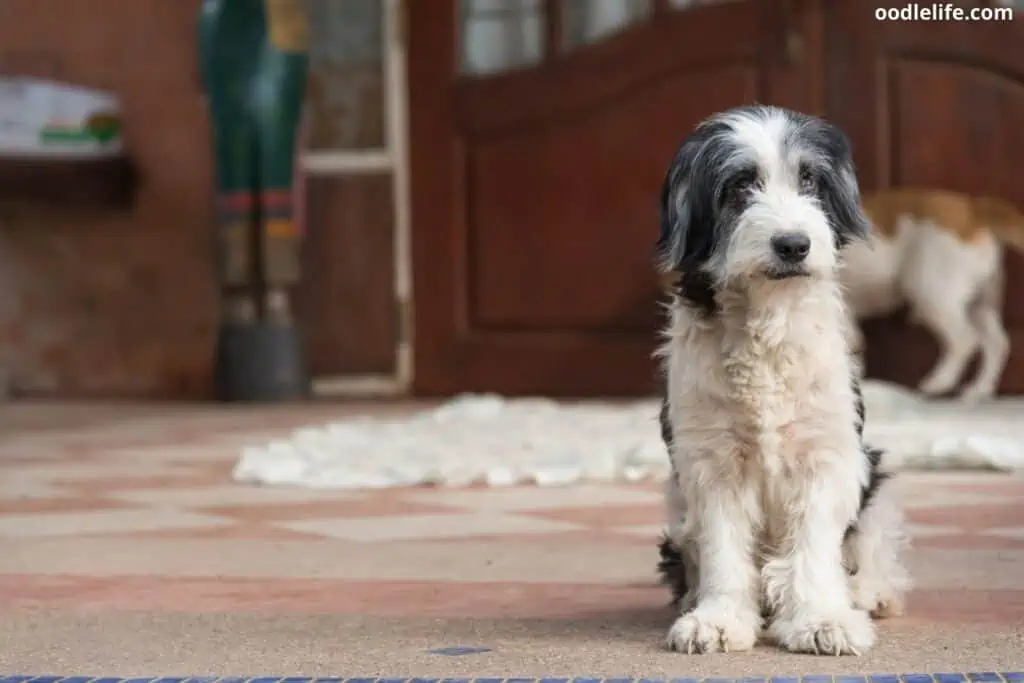
2. Traumas
Some dogs experience anxiety in a more severe way than their normal counterparts because of traumatic experiences. For example, a dog might have been neglected, beaten, or abandoned, making them more prone to worry and anxiety.

3. New Situations or Environmental Change
Dogs are creatures of habit, and they need routine. Any change in their routine or home might get them anxious as they perceive the change as a danger.
In addition, going to a new place and meeting new people or dogs can also trigger anxiety. Their ability to adapt will depend on how well they are socialized and trained.
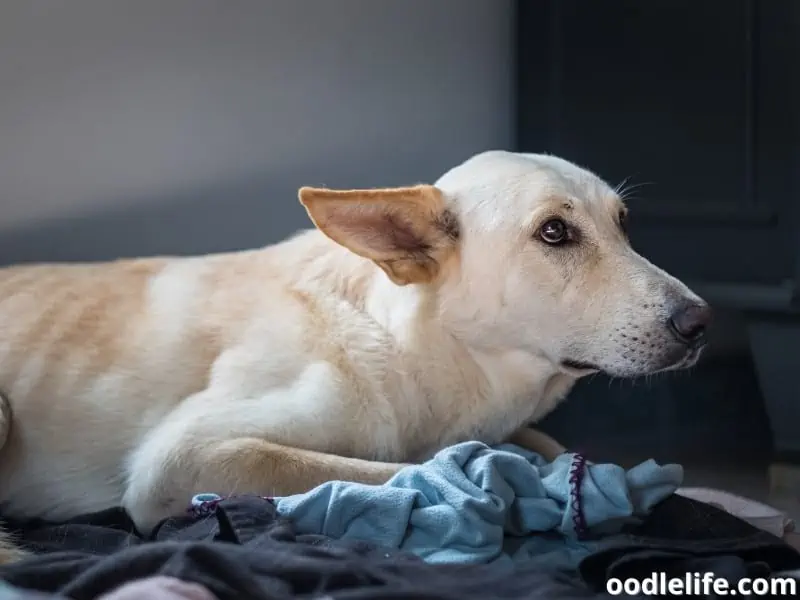
4. Loud Noises
Their sensitive hearing makes a loud sound even more jarring. Storms, fireworks, or even a vacuum cleaner might get them anxious and worried.

5. Age
Anxiety is often related to a dog’s age. Puppies might wake up in the middle of the night and get scared to be alone and without their littermates or mother.
Senior dogs may have mild mental conditions or forgetfulness that make them prone to anxiety. They might also suffer from CDS, Cognitive Canine Dysfunction, a condition where their mental capacities start to deteriorate and they become more disoriented.

6. Medical Condition
If nothing of the above reasons apply to your dog, there might be a physical condition causing them anxiety. The most common example is pain, when you’re in pain you’re automatically anxious and want a way out of it.
Other conditions may be hypothyroidism in dogs (low thyroid), diabetes, hypertension, Cushing’s disease, and urinary tract infections. If you think that your dog has a medical condition that is causing more anxiety at night, it might be prudent to visit the vet.
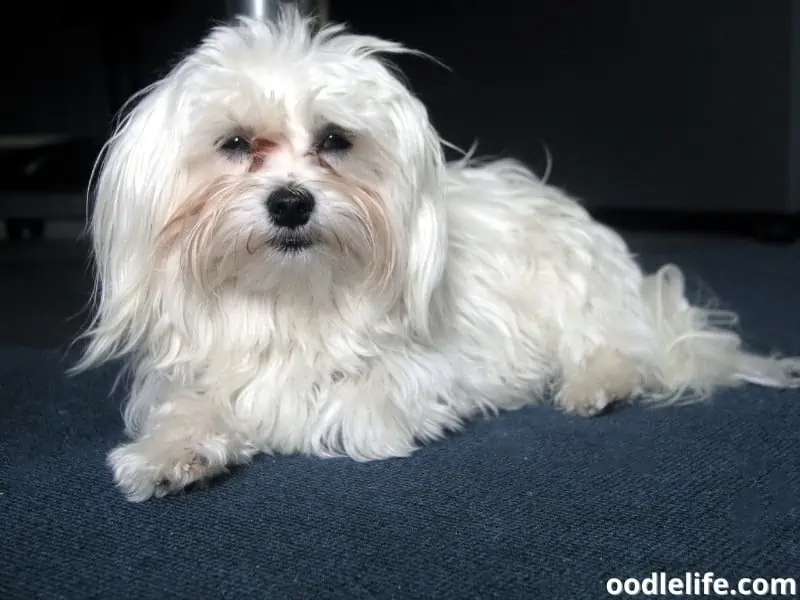
How To Calm An Anxious Dog At Night?
Fortunately, most anxiety-related conditions can be helped with some patience and understanding.
1. Figure Out Why
The key to helping your little friend deal with his night anxiety is to understand the reason or trigger. Your dog is not just being disobedient and frantic for no reason, and as unpleasant as it is for you to be bothered at night, it is infinitely worse for your poor anxious dog whose mental state is in chaos.
Before you know what to do, you need to identify the reason so you can customize the solution for your doggy.
If you can’t identify the anxiety stimulus for your dog and the problem seems to be new, then you might want to take him to the vet for a check-up in case it is physically related.
Once you identified the reason, then you can remove the triggers and help alleviate their stress.
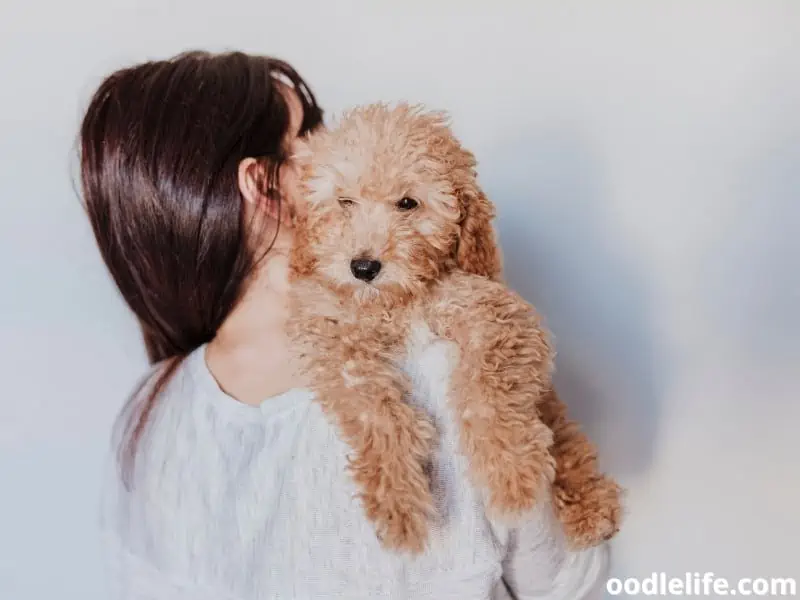
2. Create a Safe Space
Just like humans, your dog needs a safe haven too. If your dog is still a puppy, suffering from separation anxiety, or if you recently moved to a new house, then the number one crucial thing is to create a safe space for your pooch. That’s another reason to crate train your dog!
Crate training is one of the best ways to set your dog up for success. A crate provides a safe, den-like space for your dog to relax and retreat from the hustle and bustle of daily life.
When done correctly, crate training can also help to reduce separation anxiety, eliminate unwanted behaviours like chewing and barking, and make it easier to travel with your pet.
In addition, dogs who are crate trained are less likely to develop behavioural problems later in life.
If you don’t want to use a crate, pick a space in the house, whether it’s a pillow in the corner, a crib, or a bed, so they know that if things get rough or scary, they can always retreat to their spot.
If their main anxiety stimulus is being away from you, you can try putting their bed or crate as near to you as possible so they can see and smell you while they’re sleeping. Once your dog is comfortably sleeping near you, you can gradually increase the distance.

3. Exercise Loads!
Not only is exercise good for the body, but it is also good for the mind. Remember, a tired dog is a happy dog! If you give your dog loads of exercise during the day, he might be just tired enough to stay asleep all night.
Identify with your vet the right amount of exercise your dog needs according to your doggo’s breed, age, and size.
Another way to give your dog plenty of exercise are games. Not only are games valuable bonding time with your dog, but it will also give plenty of mental stimulation and keep your doggo occupied during the day.
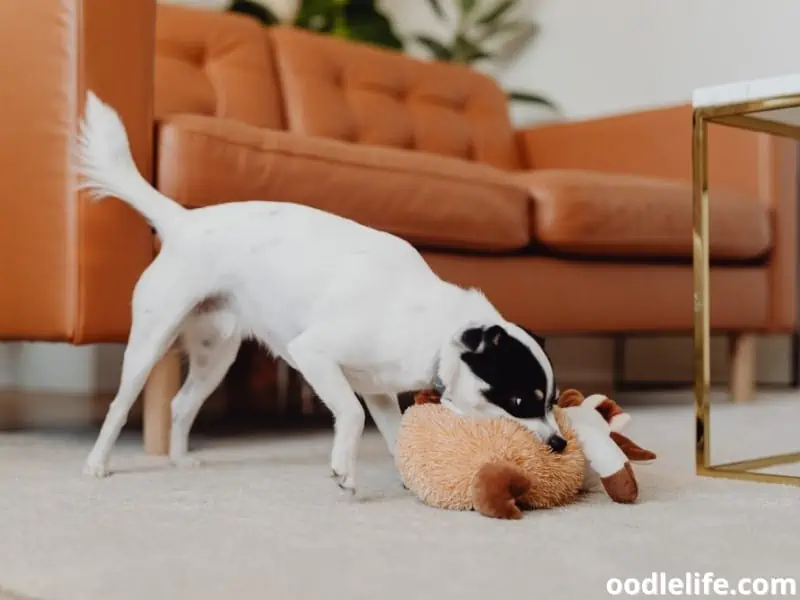
4. Bedtime Routine
Implement a bedtime routine and rigorously stick to it every day. Don’t feed a big meal just before bed, and bring your dog for a last potty before turning in for the night.
A major reason for night anxiety for dogs is their fear they won’t be able to go out to potty while you’re sleeping, so to eliminate this fear, make them go right before bedtime.
If you have a dog that has to go out and potty in the middle of the night, take them out and straight back, with minimal interaction or stimulation. The rule you want to enforce here is that you go straight back to sleep after a potty break.

5. More Socialization
A well-socialized dog is a calm, confident one. Expose your dog to as many stimuli as you can including scary stuff like vacuum cleaners and fireworks.
Meet strangers and new animals as much as possible, and go to new places in different environments. The more your dog is exposed to, the more relaxed he will be in new environments or scary situations.
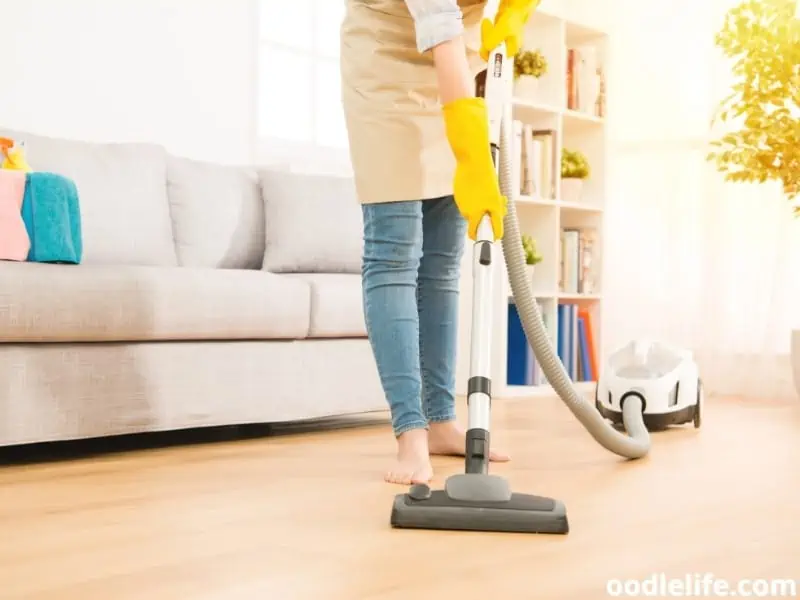
6. Loads of Hugs and Cuddles
Like a human baby, giving love and physical touch is crucial for dogs to feel safe and confident in their surroundings.
Make sure that you give enough love and warmth to your dog during the day by patting their heads, giving a belly rub, or massaging around the neck and whole body.
Petting your dog is also good for you! Stroking a dog has been shown to help lower blood pressure and reduce stress levels. It can also boost immunity and increase levels of feel-good hormones such as oxytocin and dopamine.
Additionally, petting a dog has been proven to improve mental well-being and increase feelings of happiness and relaxation. In other words, there are few activities that offer as many benefits as taking the time to pet your furry friend.
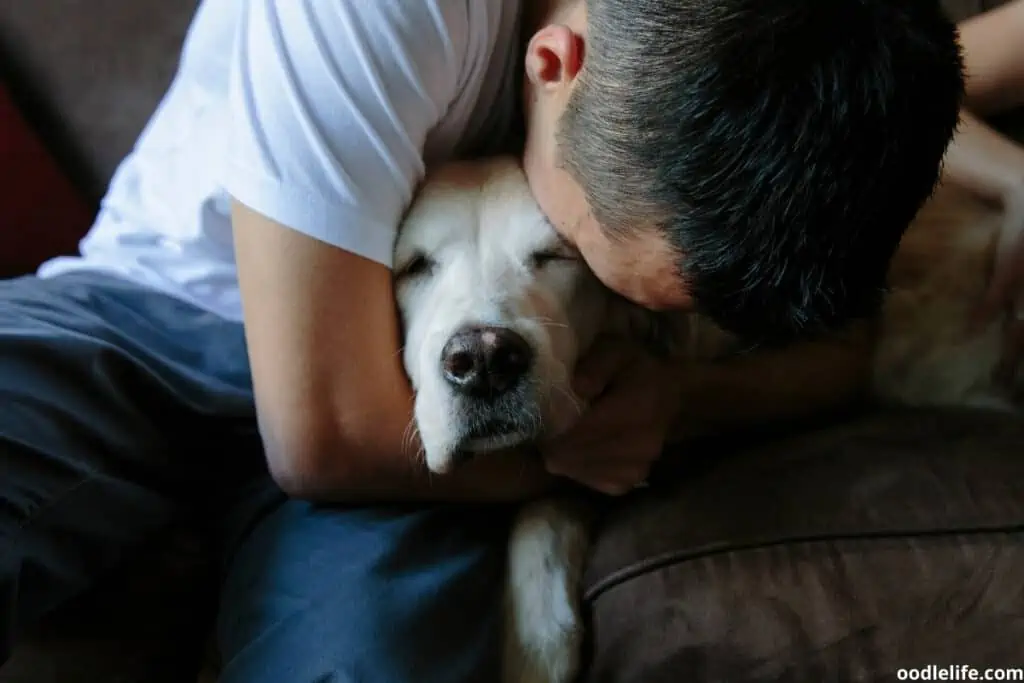
7. Ignore The Anxiety
As much as you would like to comfort your dog when he or she cries or whines through the night, don’t! They will associate their anxiety and fussing as a trigger for your affection as a reward, and very quickly learn how they can get your attention.
If you want to soothe them, do it only when they stop crying, even if they stopped for a second to catch a breath.
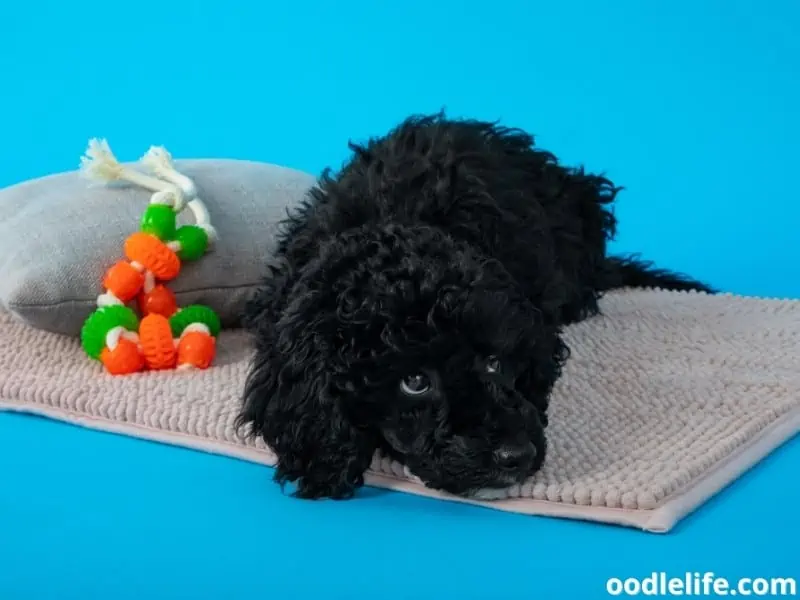
Final Thoughts
While it may seem like your dog is simply acting out, there is usually a deeper cause for their nighttime antics.
If your dog is showing signs of anxiety at night, it’s important to consult with a veterinarian or animal behaviorist to identify the root cause and develop a treatment plan. With a little help, you and your dog can overcome this challenges and enjoy a peaceful night’s sleep.